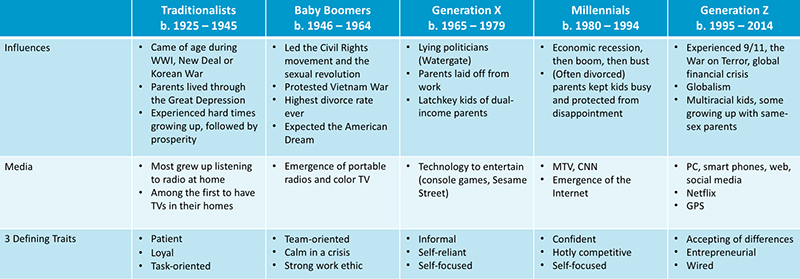For the first time ever, we now have four (sometimes five!) generations in the workforce. We’re all living longer. We’re retiring later. And new generations continue to enter the workforce. As business leaders, people managers and colleagues, we wondered how the mix is changing the way we work. Are there conflicts between the generations? What are the benefits of a cross-generational workplace? How do the generations see themselves?
To find out, we conducted a short online survey earlier this year. In one short week, we heard from 97 professionals across five generations. Wow! What a great response from our informal email and social media outreach! The responses were rich, fascinating and informative.
Spoiler Alert: Yes, there is conflict in the workplace. There are also many benefits of a multiple generations working together. And…there is strong consistency in the way the generations see themselves.
Why does a branding agency tackle a survey like this? Well, a few reasons. We are forever curious – especially about the forces and trends that shape companies’ cultures and brands. It’s a topic of great interest to many of our clients, including those who specialize in organizational development, learning, recruiting and leadership development. As a purpose-driven company ourselves, we know the power of implementing conscious business principles through collaboration. Our CEO, serves on the advisory board of Conscious Capitalism of Central Maryland, and speaks and writes on topics related to brand and culture, including this article on Why Different is Better.
This is the first of a three-part series on multiple generations in the workplace. In this blog, we introduce the generations and share what survey participants had to say about conflict in the workplace.
WHO ARE THE GENERATIONS?
Before crafting the survey, we read up on the generations. We could quickly come up with traits to describe Millennials, which some claim are the most studied generation in history. Baby Boomers, too, were familiar to us. The others, Traditionalists, Generation X and (the newest generation on the block) Generation Z were a little more difficult to describe without doing some research.
Here is a quick introduction to each generation. You’ll see the years each generation was born and some key events or trends that shaped their early years. Media influenced what and how each generation learned about news and entertainment. We’ve also included three key traits associated with each generation:

WHO RESPONDED TO THE SURVEY?
Our pool of survey respondents is generally representative of the generational mix in today’s workforce:
- Millennials are largest group (40% of participants)
- Baby Boomers (27%) and Generation X (28%) are about equally represented
- Generation Z (4%) and Traditionalists (1%) were the smallest groups
Interestingly, across the five generations, only 56% of respondents identify with their “birth” generation. We asked, “Given what you know about generational differences, which generation do you most identify with?”
- Traditionalists: 100% identify as Traditionalist
- Baby Boomers: 62% identify as their “birth generation”
- Generation X: 59% identify as Generation X
- Millennials: 56% identify as their “birth generation”
- Generation Z: 0% of our respondents identified as Generation Z. (75% were more aligned with Millennials; 25% were unsure about the differences in generations)
WHAT ARE THE CULTURE CLASHES?
We asked, “Have you observed conflict or frustration at work caused by differences between generations? If yes, please briefly describe.” 86% of respondents said, “Yes” – they have observed conflict or frustration between generations at work.
Most responses fell into one of five categories: Use of Technology, Work Ethic, Work-Life Balance, Learning and Communication. Here is a glimpse of some representative responses for each category.
Use of Technology
Gen Z and Millennials are masters at technology and value doing work and staying connected in a way that blurs the traditional work/life boundaries. Gen X and Baby Boomers are digital immigrants; they learned technology – first email, then Internet and now smartphones – as adults and believe technology at work should be for work purposes.
“The distraction of cell phones irritates the hell out of me! This inability to stay off of a phone for any length of time is something I do not understand.” – Baby Boomer
“I introduced a new scheduler system to the department and my GM came to me (after only two weeks) and said we need to go back to the old system because team members were complaining, specifically that they were the ones that were all over 50 years old.” – Millennial
Work Ethic
Team-oriented Boomers are loyal to employers. They worked hard to get where they are. Gen X values a work/life balance, but feel a responsibility to get things done. They enjoy figuring things out and finding answers. Millennials grew up having a full schedule outside of their home and school life. For them, many answers are readily available at the click of a button. For Gen Z, being connected to others day and night is a constant – there aren’t hard lines between school/work time and personal time.
“I have a hard time working a 9-5. I do best sometimes late at night, my optimum performance would be achieved by working hours spread out over the day. Many workplaces were very inflexible with this (aka, 8:30-5:30, with mandatory lunch) and I was written up or penalized for not being on time or “hours in office” even if there was never a performance complaint and I was often cited as exceeding expectations.” – Millennial
“I think my generation felt it had to pay dues and conform to get ahead; younger people seem to think they are entitled to more earlier.” – Gen X
“Millennials aren’t interested in working overtime. They are out the door at 5:00 on the dot regardless if the task they are working on is done.” – Baby Boomer
Work-Life Balance
Traditionalists, who respect the authority of employers, and Baby Boomers, who put work first – often working 60 hours/week, expect to put in effort and hours at work. Gen X has a more balanced view of work/life. Millennials and Gen Z believe that work is a way to earn money to do the things they most care about in life.
“The definition of work ethic and focus on work vs. family balance creates conflict. Balance is a new concept to Baby Boomers!” – Baby Boomer
“We tend to expect everyone to be as connected as we are and easily blend work and life.” – Millennial
“Millennials take off a lot of time, others have to cover for their “‘work balance day.’” – Gen X
Communications
Baby Boomers, Traditionalists and the early Gen Xers grew up on face-to-face and phone communications. Millennials and Gen Z use texting, email and emojis to communicate. The younger generations are more likely to rely on clear instructions and to expect explicit acknowledgement of completed tasks than older workers.
“Younger employees expect acknowledgement / promotion after a short time or basic accomplishments.” – Gen X
“Sometimes I am impatient when people prefer a style of communication different from what I like – writing vs. talking on the phone.” – Baby Boomer
“I am a nurse and many of the older generation of nurses get frustrated with the younger generations for being on their phones and not taking the time to get to know the other nurses around them.” – Millennial
“Sometimes there is a difficulty in relating to the people you work with due to the generational gap.” – Gen Z
Learning
Face-to-face training and mentoring seems to be a more natural fit for Baby Boomers and Gen X. Short videos and eLearning is comfortable for Millennials and Gen Z. These responses also reveal differences in attitudes about how others learn (or are reluctant to change).
“My generation tends to pick up things quickly (especially computers), where others tend to struggle more. We are also more willing to try and test the water before asking questions.” – Millennial
“It is frustrating that Millennials don’t seem to see the bigger picture and don’t take constructive criticism well.” – Gen X
“Older generations tend to be less flexible and say “we’ve always done XYZ this way” instead of being open to process change and streamlining efficiency. I’ve noticed some work harder, not smarter.” – Millennial
“Other generations seem not to understand how long it takes to attain mastery of something and that sometimes you have to wait your turn.” – Baby Boomer
Most organizations encourage diversity in the workplace – creating recruiting programs and cultures that embrace differences of gender and ethnicity. Yet generational diversity is often overlooked. As our survey disclosed, generational differences can strongly influence employees’ experience and productivity at work.
Take heart. There are many more reasons to embrace generational diversity at work – including the many benefits of a multi-generational workplace. In our next blog in this series, we’ll share some examples of what’s great about working with other generations in the workplace. Or if
P.S. If you’re interested in seeing the full survey results, contact us. We’d be happy to share the report.

